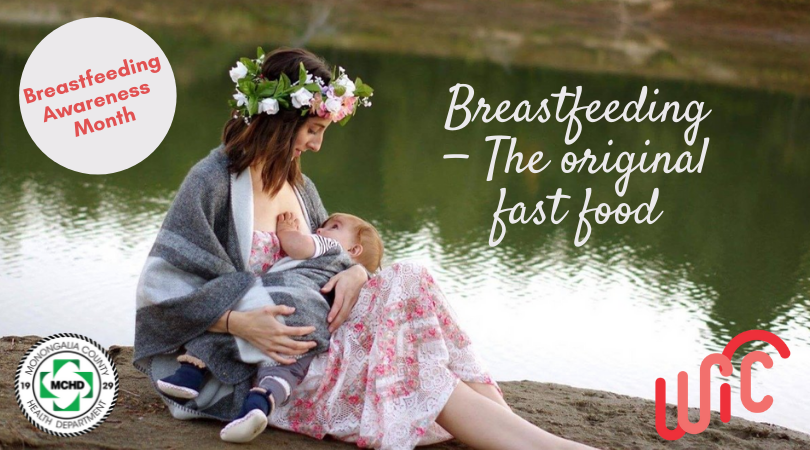Breastfeeding Awareness Month is different once again this year

Aug. 4, 2021
By Mary Wade Burnside
In a typical year, the WVU Erickson Alumni Center comes alive on the first Thursday in August, with families marching on the grounds, carrying signs with slogans such as “Breast is Best,” “Breastfeeding is nothing to be embarrassed about” and “Breastfeeding — the original fast food.”
Then, after events such as a Diaper Derby that determines the fastest crawling baby, and maybe a few photos and fist bumps with mascots Monti Bear and Cooper the Black Bear, everyone would assemble inside for healthy snacks, a slice of cake, a talk by a local breastfeeding advocate and the chance to win donated gifts such as a baby car seat or a breast pump.
Even though vaccinations have drastically lowered COVID cases and deaths and the country has been opening up again, the Breastfeeding Awareness Walk, organized by Monongalia County Health Department’s Women, Infants, & Children (WIC) program and the Monongalia County Breastfeeding Task Force, will not be held again this year as we work to welcome new participants, a process that started on Aug. 1.
But August is still Breastfeeding Awareness Month, as declared by the United States Breastfeeding Committee. And Aug. 1-7 remains World Breastfeeding Week, as determined by the World Alliance for Breastfeeding Action.
So it’s a great time to discuss breastfeeding in general, as well as during the COVID-19 pandemic.
Breastfeeding is a completely natural part of the human experience that provides both mother and baby with many benefits, including the obvious one: nutrition for the infant.
“It helps the baby’s immune system and gives them a healthier gut,” says Lynne Ryan, an MCHD WIC lactation consultant.
For the mom, breastfeeding helps normalize her weight and the state of lactating releases hormones that are relaxing, which help her body readjust after going through a pregnancy, Ryan added.
The Breastfeeding Awareness Walk is held to call attention to this normal practice and to advocate that women who feed their babies in this manner in public or who need to pump milk at the workplace be free to do so without harassment. In the Mountain State, it’s mandated in a law, the West Virginia Child’s Right to Nurse Act of 2014.
At MCHD, breastfeeding counselors talk to their pregnant clients to help them prepare for how to go about this loving task after their babies are born. WIC clients are pregnant and postpartum women and infants and children up to age 5 who meet generous income guidelines, which can be viewed at monchd.org/wic-eligibilty-guidelines.html.
Typically, MCHD WIC has conducted free breastfeeding classes for any pregnant or new mother, not just WIC clients, in the six counties covered by MCHD WIC: Monongalia, Preston, Marion, Harrison, Doddridge and Taylor.
As we open, those breastfeeding classes are resuming but will have limited space at first as we wait for COVID rates to decline more.
But, “We are still doing prenatal breastfeeding education by phone and can mail the education materials which are usually handed out in class,” Ryan said.
Participants also can use the Pacify app that coincidentally was introduced in 2019 but which really came in handy during the pandemic. The app allows breastfeeding moms to have unlimited video visits with breastfeeding experts who are available 24/7. It’s free and available to all West Virginia WIC clients.
So then there is another important question that is, unfortunately, still necessary to explore: Is breastfeeding safe if a mother has COVID? According to the American Academy of Family Physicians (AAFP), yes, if the parent has been exposed to COVID-19 but is asymptomatic.
COVID-19 is spread via respiratory droplets and, to date, studies have not detected the virus and similar infections in breast milk, according to information provided by AAFP. “So it’s recommended that moms continue to breastfeed,” said Angie Rebrook, MCHD WIC’s breastfeeding coordinator. “Milk still provides antibodies. Of course, moms should make sure and wash their hands and if she has COVID, wear a mask while breastfeeding her baby.”
Even if a parent has been diagnosed with COVID-19 or was exposed and has symptoms, it is still reasonable to breastfeed and/or provide expressed milk for the infant, according to the AAFP. Extra precautions should be taken, including limited interaction with the baby outside of breastfeeding, or avoiding the act altogether while another individuals feeds the infant expressed milk.
We hope to see our MCHD WIC families during next year’s Breastfeeding Awareness Walk and that new mothers will be even freer to feed their babies even when they are out and about on the go.
Mary Wade Burnside is the public information officer at Monongalia County Health Department.